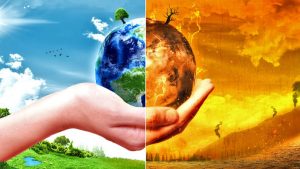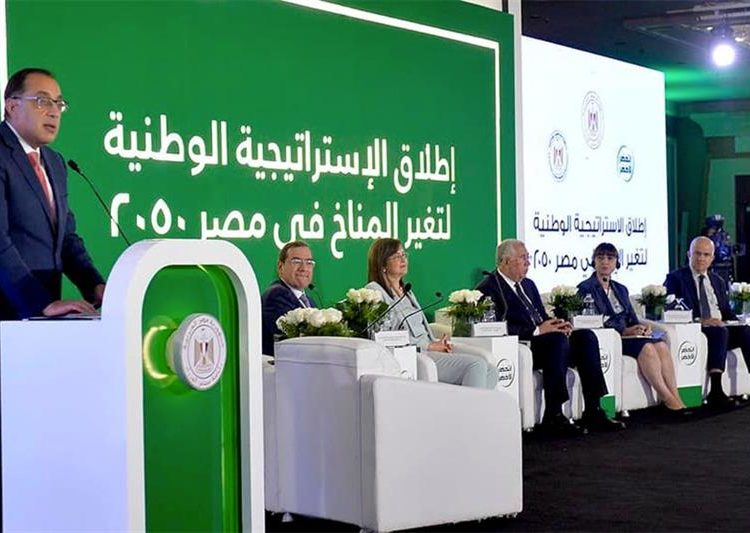Much of Egypt’s population is already suffering from the effects of climate change, and many more are at risk. If the country continues the mitigations it has started, it can still help to protect them.
Because of climate change, Egypt’s already arid climate will suffer from additional environmental stresses, including extreme temperatures, irregular precipitation, elevated sea levels and land subsidence, coastal flooding, shoreline erosion, deteriorating soil salinity, and persistent drought. These mutually reinforcing impacts will build on one another, worsening water scarcity, hindering food security, and hampering the Egyptian economy.
Egypt needs, therefore, to accelerate its climate governance efforts if it hopes to stabilise its economy and protect its vulnerable populations.
Egypt’s vision in climate issue
Egypt has implemented a number of green projects in roads, energy, solid waste and sewage, with a view to adaptation and dealing with climate change. The country has changed the international environmental agenda by placing the issue of adaptation on the priorities of the climate summits. Egypt’s presidency of the Conference on Biological Diversity and the Adaptation Alliance in August 2018 has proven its ability to have a global influence as regards the files of environmental work in a manner that serves the interests of all countries. In this respect, Egypt clarified the relationship between biodiversity and climate change through participation in many events and conferences in order to mobilise the necessary funding for this file. The political leadership believes that Egypt is an integral part of the Arab area and the African continent, and therefore it should play a pivotal role in facing the effects of climate change and unifying the African front.

UN role in confronting impacts of climate change
The United Nations has exerted strenuous efforts to save our planet. In 1992, within the ‘Earth Summit’, the United Nations Framework Convention on Climate Change has been ratified as a first step in facing the problem of climate change. Today, 197 states had joined this Convention which main target is to prevent the ‘dangerous’ human intervention in the climate system.
By 1995, countries began negotiations to strengthen the global response to climate change. Two years later, the Kyoto Protocol was adopted. Legally, the Kyoto Protocol binds developed countries to emissions. The protocol’s first commitment period began in 2008 and ended in 2012, while the second commitment period began on 1 January 2013 and ended in 2020. Today, 197 countries are parties to the Convention and 192 are Parties to the Kyoto Protocol.
In 2015, the 21st Conference of the Parties that was held in Paris reached a historic agreement to combat climate change, and to accelerate and intensify the actions and investments needed to achieve a sustainable low-carbon future. For the first time, all states agree on a common stance of exerting efforts to face the climate change and to adapt with its repercussions, along with supporting the efforts of the developing countries in this respect, thus drawing a new path in the efforts exerted towards addressing the world climate.
On April 22, 2015 and on the occasion of the Earth Day, 175 world leaders signed Paris Agreement in the United Nations premises in New York — the largest number of states signing an international agreement in one day ever. Currently, more than 184 states joined this Agreement.
The Paris Agreement was held at the COP21 conference. It is considered the most famous and most dynamic as it is the first global agreement on climate. This agreement came upon the negotiations that took place during the United Nations Climate Change Conference 21 (COP21) in Paris.
In 1992, more than 100 countries signed a treaty — called the United Nations Framework Convention on Climate Change — to cut global emissions and preserve the Earth’s climate.
Developed and developing countries (as described by the treaty) have agreed that they have different responsibilities in combating climate change. Therefore, all countries must work together and address the problem.
The Paris Agreement provides a permanent framework that will guide the global effort for decades to come with the aim of raising the ambition of the countries as regards the climate change. To reinforce this, the agreement provided for two reviews, each over a five-year period.
The climate conference COP26 which was held in October 2021 was a test of what has been implemented from the Paris Agreement.
SDGs
Tackling climate change and the pursuit of the UN Sustainable Development Goals (SDGs) are taking centre stage on both the national and international fronts, and in the wake of conflicts such as the war between Russia and Ukraine it has become more urgent than ever for countries to work on achieving the SDGs.
Recent natural disasters such as Storm Daniel, which devastated the cities of Derna and Al-Bayda in Libya resulting in widespread loss of life and damage to infrastructure, are threatening countries worldwide, along with continuously rising temperatures.
The focus now is on measures to mitigate the impacts of climate change, plans to transition to renewable energy sources, and the formulation of policies that will compel nations to take further action on climate change.
Egypt’s dedication to climate action is indispensable for attaining the SDGs, as underscored in Egypt’s Vision 2030, the National Climate Change Strategy 2050, and the revised Nationally Determined Contributions (NDGs).
NWFE programme
Based on Egypt’s presidency of the UN COP27 Climate Conference last year in Sharm el-Sheikh, Foreign Minister Sameh Shoukri emphasised the pressing global challenges confronting climate action. He stressed the imperative to bolster climate financing for developing nations and the necessity for a mechanism to address the debt concerns of low- and middle-income countries, including by potential restructuring. He also highlighted the significance of the just transition path, focusing on the NDGs and Egypt’s ‘Nexus of Water, Food and Energy’ (NWFE) programme. NWFE is a “nationally owned vision with associated targets for delivering on energy transition and resilience building.”
He noted that Egypt has issued two updates to its NDGs, with the latest update in July 2023 to include sector-specific emissions-reduction targets to be achieved by 2030 compared to business-as-usual scenarios.
Egypt’s presidency of the COP27 presented the country as a leading nation in the realm of climate change. The conference’s achievements include the historic global agreement to establish a fund aimed at financing losses and damage. This fund is expected to be activated during the upcoming COP28 Conference in the UAE, according to recent remarks by Shoukri.
Decent Life
Egypt’s successful implementation of the Decent Life presidential Initiative will enhance the quality of life for millions of citizens in rural parts of the country. Recognised by the UN as one of the most substantial poverty reduction programmes to date, the initiative encompasses a wide range of development projects aimed at improving infrastructure, education, healthcare services, employment opportunities, and ultimately reducing poverty.
It is crucial for the government to invest more in social protection, a domain witnessing both vertical and horizontal expansion. Egypt is also providing direct financial support to the most vulnerable segments of society through initiatives like the Solidarity and Dignity Programmes.
Egypt’s pledge to provide universal health insurance for all citizens by 2030 is a laudable endeavour, especially considering that 60 per cent of healthcare services involve out-of-pocket payments.
The government’s commitment to revamping educational curricula and reducing classroom overcrowding is noteworthy, in addition to its efforts to empower women and increase their participation in the labour market, given that women’s participation was 14 per cent in 2020.
Brazzaville Summit of the Three Basins of Biodiversity Ecosystems
Minister of Environment Yasmine Fouad affirmed the necessity of adopting sustainable solutions that ensure mutual gains between biodiversity and climate change.
The minister noted that international community succeeded in establishing the Rio Agreements that linked climate change, biodiversity and desertification in order to achieve an integrated and mutual connection between these sectors and their sustainable development.
Fouad made the remarks last week during the Brazzaville Summit of the Three Basins of Biodiversity Ecosystems and Tropical Forests on behalf of President Abel Fattah El Sisi.
The summit was held in the Congolese capital Kinshasa, under the theme ‘Preserving diversity and tropical forests are a necessity in the face of climate change’.
The minister referred to the crucial role played by Egypt in supporting biodiversity and climate change, adding that Egypt has exerted strenuous efforts in order to create a map of biodiversity.
She also pointed out to Egypt’s crucial role in establishing a new loss and damage (L&D) fund, which aims to enable vulnerable countries to respond to and recover from climate impacts.
The Three Basins Summit brought together leaders from the Amazon, Congo and Borneo-Mekong-Southeast Asia regions to form a global coalition, the minister said.
These regions alone account for 80 per cent of the world’s tropical forests and two-thirds of terrestrial biodiversity, playing an essential role in regulating the carbon balance.






Discussion about this post